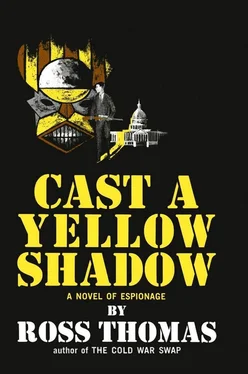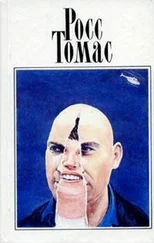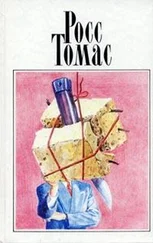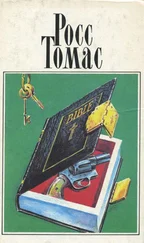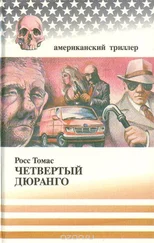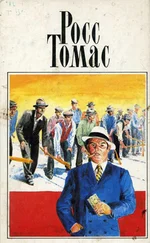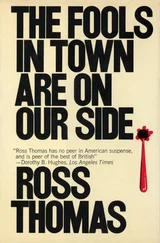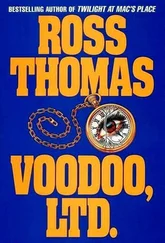Mush nodded, his face screwed up in pain. “Narcotics Bureau.”
“How’d you make me in Baltimore?”
“There were just two of you supposed to be on that boat. They gave me a print-out on both of you. You weren’t five-foot, three-inches tall and fifty years old.”
“They thought I might have the acid?”
“One of you did.”
“What are you going to do with it?” Padillo said.
Mush grimaced again. “You saw it?”
Padillo nodded. “Those two who jumped you. One of them was carrying something. He dropped it. It must have been something you wanted.”
“You’ll have to teach me that Juarez judo again. I didn’t seem to learn too well.”
“You didn’t turn it in, did you?”
“The acid?”
“That’s right.”
Mush stared at Padillo. “Not yet. You want a cut?”
“Hardman said it would make a million dollars’ worth of sugar cubes.”
“He was low.”
“And that’s why there aren’t any Federal cops up here.”
“That’s why,” Mush said.
“O.K.,” Padillo said. “Now you’re a rich man and a hero, too. You keep the acid.”
Mush opened his mouth wide and squeezed his eyes shut. The cut seemed to hurt. “I’m not keeping it,” he said. “I thought about it, but—” He shrugged and even the shrug hurt.
“One thing,” Padillo said. “Are you really a Muslim?”
“Maybe,” Mush said. “That acid would finance a hell of a lot of trips.”
“What kind?” Padillo said.
“To Mecca.”
“But you’re going to turn it in?”
Mush nodded. “I’m going to turn it in.”
“O.K. You won’t be a rich man, but you’ll be a hero. Your story is that you found out about the assassination attempt through Hardman at the last moment. Then you shot him and took care of Dymec. McCorkle and I weren’t even near the place. Price helped you. All right?”
Mush tried to stand and Padillo helped him up. “If I told it any differently, they’d start asking questions. I haven’t got much choice, have I?”
“Not much,” Padillo said. “Some perhaps, but not enough to bother with.”
“How about him?” Mush said, nodding towards Price.
“He’ll be a hero, too, but quietly.”
I took the .38 out of my pocket and put it in Mush’s hand. “This is what you shot Hardman with.”
Mush looked down at the revolver. “I liked Hardman,” he said. Then he looked at his watch. “The man’s about due.”
“Can you make it over to look?” Padillo said.
“It’s not that bad,” Mush said.
I helped Mush over to the east edge of the building. We looked down to the corner of Seventeenth and Pennsylvania. Traffic was light and the bright October sun made the Executive Office Building look a little less like an old grey ogre. On a new building at the southwest corner of the intersection, two men practiced putting on a roof-top green. Van Zandt’s party was only three minutes late. Two motorcycle policemen turned the corner at Seventeenth on to Pennsylvania. Behind them was a closed, black limousine followed by an open car with three men sitting in the rear seat. No crowds lined the sidewalk although a few people stopped to glance at the procession. Two other black cars followed the open convertible. Two more motorcycle policemen brought up the rear.
We stared down at the small parade. “Right about now would be perfect,” Padillo said.
“Not much wind,” Price agreed.
Mush said something in Arabic.
“What was that?” I said.
“From the Koran again,” Padillo said. “‘Wheresoever you be, death will overtake you, although you be in lofty towers.’”
I could see Van Zandt clearly now, even from eleven stories up. Darragh was next to him. I didn’t recognize the man on the other side. Boggs was driving. Van Zandt wore no hat and his long white hair floated around his head in the breeze created by the open car. He turned his face up to the building where we stood. The car slowed. I waved at him. Darragh was looking up now and I waved at him, too.
Neither of them waved back.
We left Mush to take credit for spoiling the assassination and brought Price with us to the parking lot where we got Hard-man’s Cadillac out.
“Which way?” I said.
“Where does the British Resident live, Price?”
“That’s not part of it,” he said.
“It is now.”
“You’ll ruin it.”
“Not when he sees the letter.”
“I’ll get the letter to him.”
“I’d feel better if I did it.”
“You don’t seem to trust Price,” I said.
“Do you?”
“Not in the least.”
“Where’s your Resident?”
Price sighed. “He lives near American University.” He recited an address.
“Will he be home?”
“He’s always home. He’s writing a book. He’s an historian.”
I drove to the address that Price gave us. It was a quiet, tree-shaded street with large, middle-aged houses set well back from the street. Two mothers pushed strollers filled with plump children down the sidewalk in the mild afternoon air. The number Price gave us was a white frame house that had two stories, a wraparound porch, and an indeterminate architectural style. I suppose it could have been called comfortable. Parking was no problem in that neighborhood and I pulled the car up to the curb next to a large tidy pile of autumn leaves. The yard in front of the house had a lot of shrubbery and flower beds and its occupant seemed to have spent rime taking care of things.
We walked up to the house, climbed the four steps of the porch, and rang the bell. A man opened the door.
“Well,” he said when he saw Price. Then he repeated it: “Well.”
“I couldn’t help it,” Price said.
The man nodded. He was about fifty and wore a grey, woolen sweater that buttoned up the front, dark grey slacks and a pair of silver-rimmed glasses that covered mild eyes that were almost the color of his sweater. He was also a little fat.
“Well,” he said for the third time. “Perhaps you should come in.” He didn’t seem overly concerned about whether we did or not.
He held open the screen door and Price went in first followed by Padillo and me. When we turned around, the man was holding a gun. It wasn’t aimed at us; it was just held so that we could see it.
“I don’t suppose this will be necessary,” he said and moved the gun a little.
“No,” Price said.
“Then I shall put it away.” He walked over to a small table that held a lamp, opened a drawer, and put the gun in it. He turned to us again.
“Perhaps you should introduce your friends,” he said to Price.
“Padillo and McCorkle,” Price said. He didn’t bother to tell us who the man in the sweater was. The mild eyes behind the glasses widened slightly when Padillo’s name was mentioned.
“Well,” the man said, “do sit down.”
We were standing in the livingroom which was filled with chairs and sofas and the usual bric-a-brac. A fire burned in the fireplace at one end of the room. Padillo and I sat in two easy chairs; Price and his employer, I suppose, sat side by side on a couch.
“Michael Padillo,” the man in the sweater said.
“I’m in your book,” Padillo said. “I want out.”
“Yes,” the man said and reached into his sweater pocket and pulled out a pipe. He didn’t need it really. He had the worn sweater and the comfortable house and the burning fireplace. He didn’t need the pipe to complete the scene. We waited while he filled it and lighted it and put his wooden matches in an ashtray.
“In my book, you say.”
“Stan Burmser told me about it,” Padillo said. “You know Stan?”
“Hmmm.”
Читать дальше
